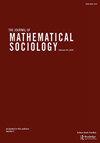An agent-based model of deliberative democracy and polarization
IF 1.3
4区 社会学
Q3 MATHEMATICS, INTERDISCIPLINARY APPLICATIONS
引用次数: 1
Abstract
ABSTRACT In this paper, we examined the effect of deliberative democracy on the polarization of opinion. Through three case analyses, we find that deliberative democracy has two major components – provision of information and group discussion. Polarization of opinion can be explained by several theories: social identity theory, social comparison, and confirmation bias. We constructed a deliberative democracy model that reflected these mechanisms of polarization. We found that deliberative democracy actually decreased polarization of opinion when group discussion was a strong factor. Our study provides guidelines for an institutional design incorporating deliberative democracy, with emphasis on the composition of unbiased group discussions.基于代理人的协商民主与两极分化模型
摘要本文考察了协商民主对意见两极分化的影响。通过三个案例分析,我们发现协商民主有两个主要组成部分——信息提供和小组讨论。意见极化可以由社会认同理论、社会比较理论和确认偏差理论来解释。我们构建了一个协商民主模型,反映了这些极化机制。我们发现,当小组讨论是一个强有力的因素时,协商民主实际上减少了意见的两极分化。我们的研究为纳入协商民主的制度设计提供了指导方针,强调公正的小组讨论的组成。
本文章由计算机程序翻译,如有差异,请以英文原文为准。
求助全文
约1分钟内获得全文
求助全文
来源期刊

Journal of Mathematical Sociology
数学-数学跨学科应用
CiteScore
2.90
自引率
10.00%
发文量
5
审稿时长
>12 weeks
期刊介绍:
The goal of the Journal of Mathematical Sociology is to publish models and mathematical techniques that would likely be useful to professional sociologists. The Journal also welcomes papers of mutual interest to social scientists and other social and behavioral scientists, as well as papers by non-social scientists that may encourage fruitful connections between sociology and other disciplines. Reviews of new or developing areas of mathematics and mathematical modeling that may have significant applications in sociology will also be considered.
The Journal of Mathematical Sociology is published in association with the International Network for Social Network Analysis, the Japanese Association for Mathematical Sociology, the Mathematical Sociology Section of the American Sociological Association, and the Methodology Section of the American Sociological Association.
 求助内容:
求助内容: 应助结果提醒方式:
应助结果提醒方式:


